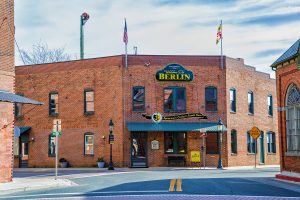
BERLIN – Stormwater, trees and affordable housing were among the issues citizens shared as discussion of the town’s comprehensive plan began this week.
Several residents attended Wednesday’s meeting of the Berlin Planning Commission to provide input as the group begins the process of updating the town’s comprehensive plan. The commission is expected to start hosting meetings the fourth Wednesday of each month solely to discuss the comprehensive plan.
“It’s probably going to be at least six months to make this better, more modern,” Planning Director Dave Engelhart said.
The comprehensive plan, a document that guides future growth in the town, was drafted in 2010. While it’s been reviewed several times, the commission this year will be reviewing and updating it again. They invited members of the public to share input on Wednesday as the process begins.
Councilman Jack Orris brought up the stormwater issues in town.
“To be sure, pages 49 to 52 of the existing plan allude to what should be done in terms of stormwater management/maintenance but doesn’t specify exactly how or what we do for the end game of those goals,” he said. “I believe now is the time to include efficient stormwater management as one of our top goals for the town and we should include it in both our comprehensive and strategic plans.”
Commission member Matt Stoehr agreed the issue was one that came up but said it was beyond the expertise of the planning commission.
“I don’t know what the answer is,” he said.
While Engelhart said the town worked under requirements from the Maryland Department of the Environment, commission member Ron Cascio said there was no inspection or enforcement when it came to stormwater management. Engelhart said that in his 10 years with the town the municipality had been targeting five specific stormwater improvement projects, three of which have been completed.
“I think we do address it,” he said. “It’s just a slower moving turtle than we thought.”
Resident Joan Maloof said she wanted the town to focus on resource conservation. She said she’d watched the town lose forest cover in recent years and felt there needed to be specific goals related to trees. She also would like to see an open space commission.
“I think we need to be forward thinking and preserve more land,” she said.
Resident Gina Velong agreed the town needed to do more regarding trees and suggested officials also establish guidelines for what trees should be planted when lots were developed. She also voiced concerns about stormwater and said she worried recently approved projects would only make drainage in town worse.
Resident Tony Weeg said he thought a form-based code, one that bases development more on context than land use, would help Berlin.
“You have to be a bit more lenient on some of the land uses,” he said.
Other interests Weeg brought up included improving the walkability of town, addressing the future of Heron Park and the need for an annexation moratorium.
“Make it a strategic thing,” he said.
Cam Bunting, a Berlin residents and real estate broker, told the commission she was worried about the potential impact of state legislation that would promote accessory dwelling units.
“That’s going to change a lot in the future,” she said.
The lack of affordable housing in Berlin was the issue raised by resident Gabe Purnell. Purnell, who owns property on Flower Street, said the town should consider adding more R-3 residential zoning. He also addressed the importance of the Flower Street neighborhood and suggested the town find a way to preserve it. He said visitors were always surprised by it.
“They say ‘wow, it looks like it’s from a different century,’” he said.
Worcester County Commissioner Diana Purnell echoed her husband’s comments regarding the significance of Flower Street but said that in holding on to what it had the town also needed to make itself better.
“You want to be inclusive,” she said.
Purnell believes Flower Street deserves the same attention “Berlin proper” gets. She does not want Route 113 to divide the town.
“My concern is, when you work on the comprehensive plan it’s not two things you’re working on but one area—Berlin,” she said.
Purnell said she would have liked to have seen the two council members who represent the Flower Street neighborhood at the meeting and encouraging their constituents to weigh in on the comprehensive plan.
“The comprehensive plan is not comprehensive unless you’ve got everybody in the process,” she said.
Resident Marie Velong said the accessory dwelling unit issue Bunting brought up could in fact help Berlin. She also spoke about the need to address stormwater and drainage issues in town.
The commission is expected to meet again to discuss the comprehensive plan Jan. 24.

